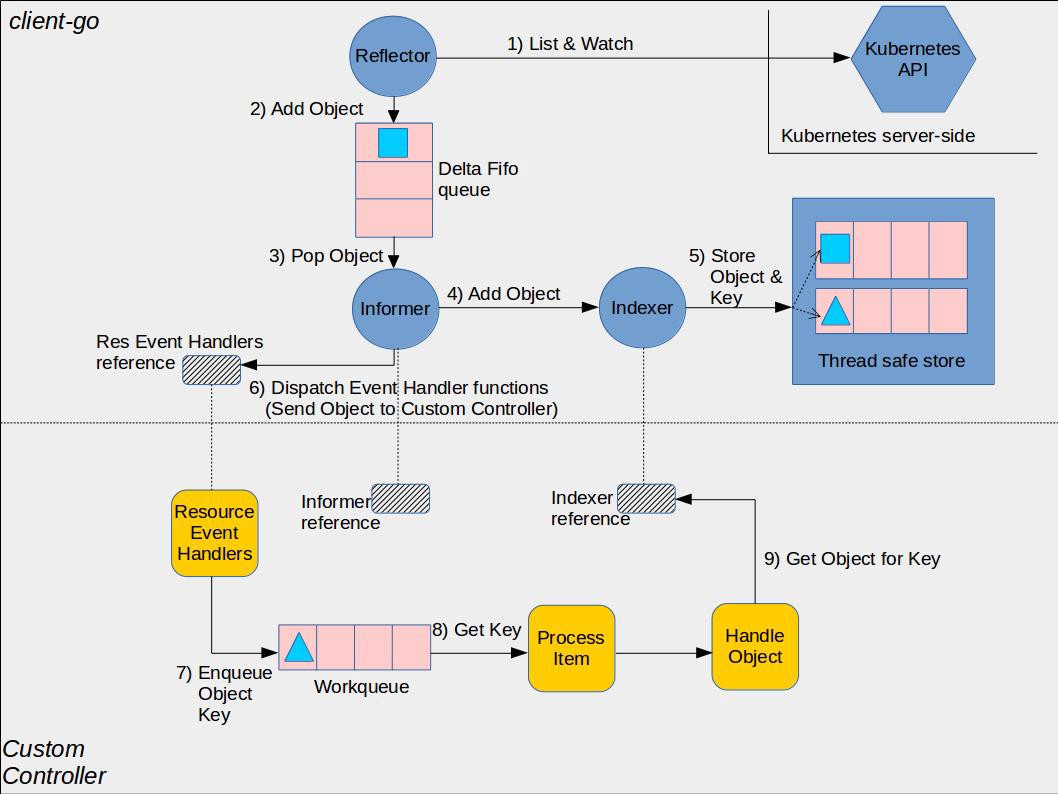
看这个client-go的架构图,DeltaFIFO是一个生产者-消费者队列,生产者是Reflector,消费者是Pop()方法。
一、DeltaFIFO
Delta是存储的元数据,能够了解到数据的变化。
1
2
3
4
5
6
|
type Delta struct {
Type DeltaType
Object interface{}
}
type Deltas []Delta
|
DeltaType记录了数据变化的类型
1
2
3
4
5
6
7
8
9
10
|
type DeltaType string
// Change type definition
const (
Added DeltaType = "Added"
Updated DeltaType = "Updated"
Deleted DeltaType = "Deleted"
Replaced DeltaType = "Replaced"
Sync DeltaType = "Sync"
)
|
DeltaFIFO的定义 :
1
2
3
4
5
6
7
8
9
10
11
12
|
type DeltaFIFO struct {
lock sync.RWMutex
cond sync.Cond
items map[string]Deltas
queue []string
populated bool
initialPopulationCount int
keyFunc KeyFunc
knownObjects KeyListerGetter
closed bool
emitDeltaTypeReplaced bool
}
|
item:按照key-value存储对象,value是Delta数组queue:先入先出的队列,存储的是对象的keypopulated:标识第一次将对象放入队列,或第一次调用增删改接口时为trueinitialPopulationCount:第一次对象放入队列的数量keyFunc:对象键计算函数knownObjects:指向Indexer
1.1、KeyListerGetter
KeyListerGetter是一个通用的接口,定义了返回所有的key和通过key获取对象两个方法。
1
2
3
4
5
6
7
8
9
10
11
12
|
type KeyListerGetter interface {
KeyLister
KeyGetter
}
type KeyLister interface {
ListKeys() []string
}
type KeyGetter interface {
GetByKey(key string) (value interface{}, exists bool, err error)
}
|
1.2、Queue
DeltaFIFO是实现了Queue接口,Queue继承了Store接口,可以让对象有序弹出。
1
2
3
4
5
6
7
|
type Queue interface {
Store
Pop(PopProcessFunc) (interface{}, error)
AddIfNotPresent(interface{}) error
HasSynced() bool
Close()
}
|
1.3、数据状态
Deltas是数组,存储数据变更状态,例如0号位存储最老的状态,末位存储最新的状态。
1
2
3
4
5
6
7
8
9
10
11
12
13
|
func (d Deltas) Oldest() *Delta {
if len(d) > 0 {
return &d[0]
}
return nil
}
func (d Deltas) Newest() *Delta {
if n := len(d); n > 0 {
return &d[n-1]
}
return nil
}
|
1.4、初始化
有两种方法初始化,一种是通过Indexer的keyFunc和它的存储方法初始化
1
2
3
4
5
6
|
func NewDeltaFIFO(keyFunc KeyFunc, knownObjects KeyListerGetter) *DeltaFIFO {
return NewDeltaFIFOWithOptions(DeltaFIFOOptions{
KeyFunction: keyFunc,
KnownObjects: knownObjects,
})
}
|
另一种方法是通过选项初始化
1
2
3
4
5
6
7
8
9
10
11
12
13
14
15
16
17
18
19
20
21
22
|
type DeltaFIFOOptions struct {
KeyFunction KeyFunc
KnownObjects KeyListerGetter
EmitDeltaTypeReplaced bool
}
func NewDeltaFIFOWithOptions(opts DeltaFIFOOptions) *DeltaFIFO {
if opts.KeyFunction == nil {
opts.KeyFunction = MetaNamespaceKeyFunc
}
f := &DeltaFIFO{
items: map[string]Deltas{},
queue: []string{},
keyFunc: opts.KeyFunction,
knownObjects: opts.KnownObjects,
emitDeltaTypeReplaced: opts.EmitDeltaTypeReplaced,
}
f.cond.L = &f.lock
return f
}
|
二、Queue
2.1、KeyOf
计算Deltas对象的key,最终使用的是Indexer的keyFunc方法。
1
2
3
4
5
6
7
8
9
10
11
12
|
func (f *DeltaFIFO) KeyOf(obj interface{}) (string, error) {
if d, ok := obj.(Deltas); ok {
if len(d) == 0 {
return "", KeyError{obj, ErrZeroLengthDeltasObject}
}
obj = d.Newest().Object
}
if d, ok := obj.(DeletedFinalStateUnknown); ok {
return d.Key, nil
}
return f.keyFunc(obj)
}
|
2.2、List
List返回对象的最新版本
1
2
3
4
5
6
7
8
9
10
11
12
13
|
func (f *DeltaFIFO) List() []interface{} {
f.lock.RLock()
defer f.lock.RUnlock()
return f.listLocked()
}
func (f *DeltaFIFO) listLocked() []interface{} {
list := make([]interface{}, 0, len(f.items))
for _, item := range f.items {
list = append(list, item.Newest().Object)
}
return list
}
|
ListKeys返回对象的键
1
2
3
4
5
6
7
8
9
|
func (f *DeltaFIFO) ListKeys() []string {
f.lock.RLock()
defer f.lock.RUnlock()
list := make([]string, 0, len(f.queue))
for _, key := range f.queue {
list = append(list, key)
}
return list
}
|
2.3、GET
Get获取对象接口,用对象获取对象
1
2
3
4
5
6
7
|
func (f *DeltaFIFO) Get(obj interface{}) (item interface{}, exists bool, err error) {
key, err := f.KeyOf(obj)
if err != nil {
return nil, false, KeyError{obj, err}
}
return f.GetByKey(key)
}
|
GetByKey通过对象键获取对象
1
2
3
4
5
6
7
8
9
10
11
|
func (f *DeltaFIFO) GetByKey(key string) (item interface{}, exists bool, err error) {
f.lock.RLock()
defer f.lock.RUnlock()
d, exists := f.items[key]
if exists {
// Copy item's slice so operations on this slice
// won't interfere with the object we return.
d = copyDeltas(d)
}
return d, exists, nil
}
|
2.4、Add/Update/Delete
增删改操作都是调用的queueActionLocked方法,删除方法多了一步就是在item里删除对象
1
2
3
4
5
6
7
8
9
10
11
12
13
14
15
16
17
18
19
20
21
22
23
24
25
26
27
28
29
30
31
32
33
34
35
36
|
func (f *DeltaFIFO) Add(obj interface{}) error {
f.lock.Lock()
defer f.lock.Unlock()
f.populated = true
return f.queueActionLocked(Added, obj)
}
func (f *DeltaFIFO) Update(obj interface{}) error {
f.lock.Lock()
defer f.lock.Unlock()
f.populated = true
return f.queueActionLocked(Updated, obj)
}
func (f *DeltaFIFO) Delete(obj interface{}) error {
id, err := f.KeyOf(obj)
if err != nil {
return KeyError{obj, err}
}
f.lock.Lock()
defer f.lock.Unlock()
f.populated = true
if f.knownObjects == nil {
if _, exists := f.items[id]; !exists {
return nil
}
} else {
_, exists, err := f.knownObjects.GetByKey(id)
_, itemsExist := f.items[id]
if err == nil && !exists && !itemsExist {
return nil
}
}
return f.queueActionLocked(Deleted, obj)
}
|
在queueActionLocked方法中,Add/Update/Delete操作其实都需要保存下来,记录在Deltas
1
2
3
4
5
6
7
8
9
10
11
12
13
14
15
16
17
18
19
20
21
22
23
24
|
func (f *DeltaFIFO) queueActionLocked(actionType DeltaType, obj interface{}) error {
id, err := f.KeyOf(obj)
if err != nil {
return KeyError{obj, err}
}
oldDeltas := f.items[id]
newDeltas := append(oldDeltas, Delta{actionType, obj})
newDeltas = dedupDeltas(newDeltas)
if len(newDeltas) > 0 {
if _, exists := f.items[id]; !exists {
f.queue = append(f.queue, id)
}
f.items[id] = newDeltas
f.cond.Broadcast()
} else {
if oldDeltas == nil {
return nil
}
f.items[id] = newDeltas
return fmt.Errorf("Impossible dedupDeltas for id=%q: oldDeltas=%#+v, obj=%#+v; broke DeltaFIFO invariant by storing empty Deltas", id, oldDeltas, obj)
}
return nil
}
|
- 首先计算出资源对象的key
- 将
actionType和资源对象构造成Delta,通过dedupDeltas去重
- 将新的
Deltas添加进items中,通过cond.Broadcast通知所有的消费者接触阻塞
另一个方法AddIfNotPresent,看名字就能知道,如果不存在就新增
1
2
3
4
5
6
7
8
9
10
11
12
13
14
15
16
17
18
19
20
21
22
23
24
25
|
func (f *DeltaFIFO) AddIfNotPresent(obj interface{}) error {
deltas, ok := obj.(Deltas)
if !ok {
return fmt.Errorf("object must be of type deltas, but got: %#v", obj)
}
id, err := f.KeyOf(deltas)
if err != nil {
return KeyError{obj, err}
}
f.lock.Lock()
defer f.lock.Unlock()
f.addIfNotPresent(id, deltas)
return nil
}
func (f *DeltaFIFO) addIfNotPresent(id string, deltas Deltas) {
f.populated = true
if _, exists := f.items[id]; exists {
return
}
f.queue = append(f.queue, id)
f.items[id] = deltas
f.cond.Broadcast()
}
|
2.5、Replace
原子性地做两件事:保存数据;删除不存在的数据
1
2
3
4
5
6
7
8
9
10
11
12
13
14
15
16
17
18
19
20
21
22
23
24
25
26
27
28
29
30
31
32
33
34
35
36
37
38
39
40
41
42
43
44
45
46
47
48
49
50
51
52
53
54
55
56
57
58
59
60
61
62
63
64
65
66
67
68
69
70
71
|
func (f *DeltaFIFO) Replace(list []interface{}, _ string) error {
f.lock.Lock()
defer f.lock.Unlock()
keys := make(sets.String, len(list))
action := Sync
if f.emitDeltaTypeReplaced {
action = Replaced
}
for _, item := range list {
key, err := f.KeyOf(item)
if err != nil {
return KeyError{item, err}
}
keys.Insert(key)
if err := f.queueActionLocked(action, item); err != nil {
return fmt.Errorf("couldn't enqueue object: %v", err)
}
}
if f.knownObjects == nil {
queuedDeletions := 0
for k, oldItem := range f.items {
if keys.Has(k) {
continue
}
var deletedObj interface{}
if n := oldItem.Newest(); n != nil {
deletedObj = n.Object
}
queuedDeletions++
if err := f.queueActionLocked(Deleted, DeletedFinalStateUnknown{k, deletedObj}); err != nil {
return err
}
}
// 首次添加
if !f.populated {
f.populated = true
f.initialPopulationCount = keys.Len() + queuedDeletions
}
return nil
}
knownKeys := f.knownObjects.ListKeys()
queuedDeletions := 0
for _, k := range knownKeys {
if keys.Has(k) {
continue
}
deletedObj, exists, err := f.knownObjects.GetByKey(k)
if err != nil {
deletedObj = nil
} else if !exists {
deletedObj = nil
}
queuedDeletions++
if err := f.queueActionLocked(Deleted, DeletedFinalStateUnknown{k, deletedObj}); err != nil {
return err
}
}
if !f.populated {
f.populated = true
f.initialPopulationCount = keys.Len() + queuedDeletions
}
return nil
}
|
这里对knownObjects也就是是否存在Indexer,如果没有就在items里查找不存在的数据,如果有就去Indexer中查找不存在的数据。
2.6、Resync

